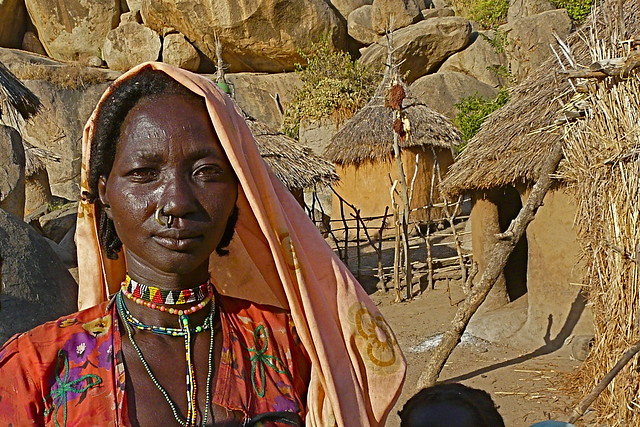Sudanese women held without trial in El-Obeid denied medical care
February 20, 2013 (KHARTOUM) – More than 30 Sudanese women detained arbitrarily in El-Obeid without access to a lawyer since 12 November 2012, are being denied adequate medical care and the lives of several of the women may be at risk, according to a statement released by Amnesty International.

A woman in a Nuba village in South Kordofan, taken by Rita Willaert, 2008
The women are being held in El-Obeid prison in central Sudan, following their transfer from the South Kordofan capital, Kadugli.
The National Intelligence and Security Services (NISS) in Kadugli began summoning women from the Nuba community who were residing in town early last November.
Amnesty said the women were accused of spying on behalf of the Southern-aligned Sudan People’s Liberation Movement-North (SPLM–N), a banned opposition party whose armed wing is fighting government forces in the state.
On 12 November, 32 women were detained incommunicado in Kadugli prison, before being transferred to El-Obeid prison on 27 December. While they have since been allowed to receive family visits, they have not been charged and authorities continue to deny them access to a lawyer and proper medical care.
One woman suffers from seizures and sustained loss of consciousness, but has been denied treatment in El-Obeid. Another woman suffered a spinal injury in detention and although she was transferred to a hospital in Khartoum on 6 February, she is yet to receive medical treatment. Two other women also reportedly suffer from seizures and another one from diabetes.
Amnesty has called on the Sudanese government to immediately charge the detained women with recognisable criminal offences or release them without delay. It has also asked that authorities grant the women access to legal representation, as well as provide immediate medical care for those who require it.
Clashes in South Kordofan between SPLM-N rebels and Sudanese government forces broke out a month before the South seceded from the north in July 2011 under a 2005 peace deal that ended decades of civil war. A few months later the conflict expanded to Blue Nile state, which also lies on the borders with South Sudan.
Indiscriminate aerial bombardments by Sudanese troops on rebel-controlled areas, coupled with the blocking of humanitarian assistance to conflict-affected areas has killed scores of civilians and driven thousands from their homes.
Sudanese authorities have arrested numerous real or perceived SPLM–N activists across the country since the conflict began in South Kordofan and Blue Nile states, many of whom have been detained on the basis of their ethnicity, often without charge, and without access to lawyers or their families.
The 2010 National Security Act provides the NISS powers to search and seize assets and to arrest and detain people for up to four-and-a-half months without judicial oversight. Under the same act, NISS agents are provided with immunity from prosecution for any act committed in the course of their work.
Amnesty has expressed concerns that the provisions in the Act do not ensure that detainees held by the NISS have access to judicial review and other human rights, adding that the Act does not comply with international norms of fair trial and other human rights standards.
(ST)
